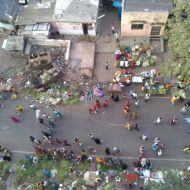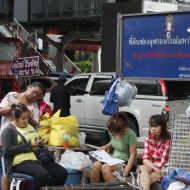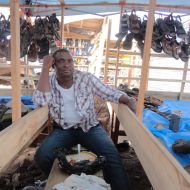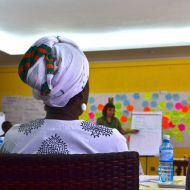The Informal World’s Crime Problem Cannot Be Overlooked
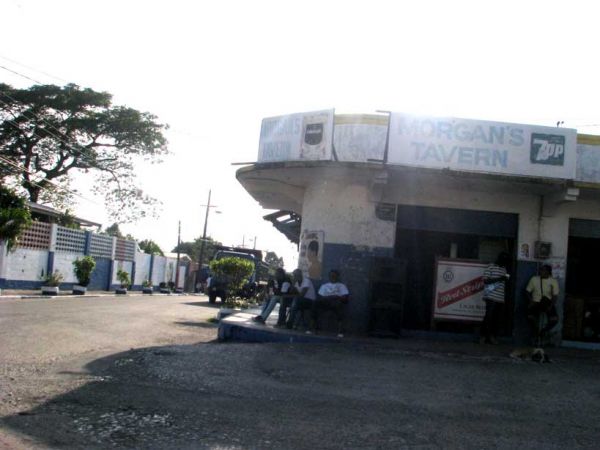
A shop in Kingston, where informal settlements provide a haven for criminals, argues Dr. Johnson. Photo credit: Dubdem Sound System via Flickr Creative Commons
In a guest blog post, Jamaican author and political commentator Hume N. Johnson argues that, despite its advantages for the poor, the informal sector harbors an active criminal element that must be dealt with. You can read a different perspective on this issue by clicking here.
The practices of illegal vending, squatting, panhandling and other subsistence activities now form a principal economic motif of many urban centers across the Global South. This is due in large part to the marginalization of poor countries from the bounty of the world economy, including high unemployment, income inequalities, substantial decline in exports and foreign direct investments, and the overall failure of Third World governments to boost their economies, improve standards of living and offer their poor any kind of meaningful life.
It is estimated that over 70 percent of people in developing countries — from India and Africa to Latin America and the Middle East — live in abject poverty, and approximately one billion are engaged in a desperate daily struggle. These people, who exist on the margins of their societies, are forced to seek creative ways to eke out an existence. The informal economy is an organic response to this impoverishment. But it is also a space that provides harbor for extra-legal activities and a haven for both lawful and criminal actors.
Crime, Congestion, Chaos
For close to fifty years, powerful, politically connected criminals called “dons” have encroached, Mafia style, on Kingston, Jamaica’s informal sphere, enacted illicit rules using coercive tactics and created outlaw forms of leadership in urban communities (labeled garrisons). Fear is the weapon driving their hold on the informal space. Extortion, burglary and murder-for-hire are their way of life. Their resistance to social rules is a direct reaction to the deficits of state governance and how they revise the terms dictated by globalization.
Indeed, the survival strategies of ordinary informals in Jamaica (as elsewhere) often “skirt the boundaries of civil and lawful behavior,” writes Trevor Munroe in Renewing Democracy Into the Millennium: The Jamaican Experience in Perspective. Small-scale entrepreneurs and medium scale vendors may engage in small-scale tax evasion and corruption. Petty traders such as handcart men or “hustlers” sell miscellaneous items, including some stolen goods. A low-wage sector of the mostly unskilled – household helpers, street cleaners, garbage collectors, office assistants and janitors, as well as panhandlers and squatters, may engage in petty crimes to subsist. This is while career criminals – criminal dons, robbers (including shoplifters and pickpockets) and gangsters – represent informals who live solely by illegal activities, siphon resources from the state or big business, and engage in drug trafficking, large-scale fraud, money-laundering, extortion and burglary.
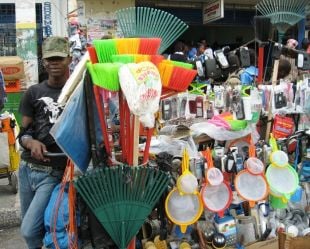
Informal street vendors encroach on sidewalks and sometimes sell stolen goods. Photo credit: Hume N. Johnson
The permanently unemployed and those groups engaged in small-scale self-employment and petty trading have also resorted to unlawful and direct acquisition of collective goods such as electricity and water. They have secured land and shelter in Kingston by “capturing” what have become present-day squatter settlements of Riverton City, Callaloo Bed and Mona Commons, as well as Railway Lane in Spanish Town and Karachi Lands in Montego Bay. They access electricity and piped water by making illegal connections from the Jamaica Public Service Company and the state owned National Water Commission. Informals find favorable business conditions and locations on the street pavements, intersections and bus stops of Princess, Pechon, Beckford and Orange Streets in the commercial district of Downtown Kingston. Many of these streets are currently impassable to emergency vehicles, delivery trucks of big-business operators while pedestrians, shoppers, tarpaulin ceilings, illegal electrical connections and vending choke the roadways.
In other words, whereas the informal economy has had the beneficial effect of helping the poor make ends meet, it is important to accept that informals are not always civil and orderly, and at times their activities intersect with illegality and provide a ready context for crime. In Kingston’s urban subculture, informals boast a powerful sense of racial and class deprivation. Survival, to escape poverty and improve their lives, is their prerogative. Hence, there is no shame in resorting to crime and numerous forms of illegality. Yet the scholarship on informality can no longer pay scant attention to the urban disorder, crime and incivility occasioned by such practices.
Informality is an organic response to economic stagnation in the Third World and is not only inescapable but, in some instances, welcomed. It eases the jobs deficit in the formal economy and gives the poor the space to re-imagine development, to direct it on their own terms. Policymakers, however, are obliged to reconstruct the urban space, and provide the same business opportunities for the poor as they do for big business: adequate vending spaces, protection from criminal dons and gangsters and access to social goods that are tied to larger state structures and processes. Meanwhile, Kingston’s informals must come to appreciate that their autonomy and collective political power does not free them from the regulations, institutional structures and discipline imposed by the state. After all, the vexing practices of informals here collide with the state’s obligation to maintain social order and uphold the rule of law.
Dr. Hume N. Johnson is a political analyst and lecturer. Her book, Challenges to Civil Society: Popular Protest and Governance in Jamaica was published in 2011. This blog post was adapted by Dr. Johnson from a longer article she had written previously. Read the full article here.


